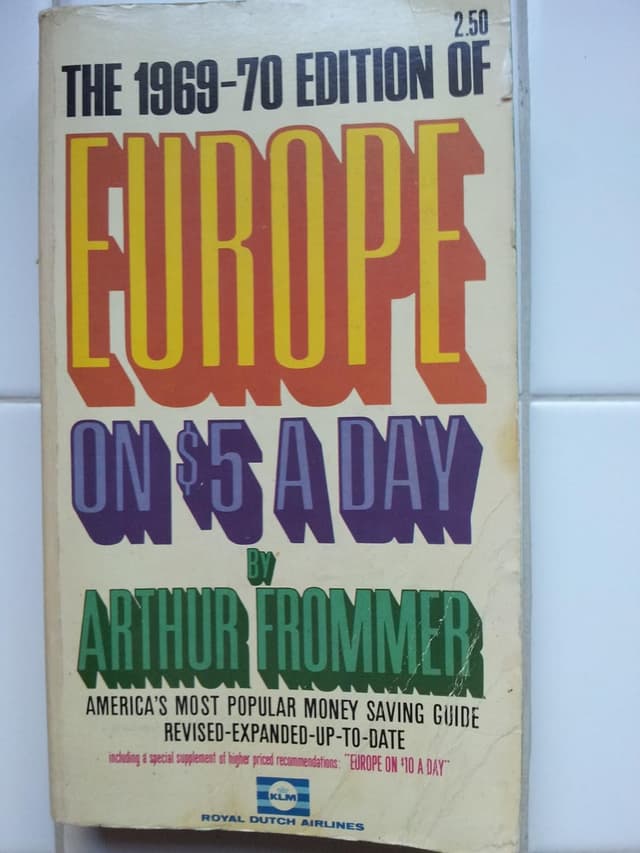Steve Bryant | March 7, 2024
The Spy Travel Edition
On the CIA, Fodor’s, and Watergate revelations.
Recommended Products

A guidebook by Arthur Frommer that inaugurated the age of budget travel.
Steve Bryant (SB) is the author of several WITIs (Jeep edition, Aguas edition, more) and currently lives south of the border, where he’s busy writing Julian’s, a “deep time” handbook to Mexico City.
Much is written in the press about the link between the Central Intelligence Agency and Hollywood, but what’s less well-known, these days, is the U.S. government’s influence on the travel industry, and how modern American travel guides were created by literal spies.
Why is this interesting?
Eugene Fodor, publisher of one of the most successful guide book series of all time, was an officer for the Office of Strategic Services (predecessor to the CIA) during WWII. He specialized in psychological warfare, interrogated prisoners, and wrote propaganda leaflets that were airdropped into the Neapolitan territories. After the war he founded his eponymous company where he employed not only traditional stringers to write copy but also, at the behest of the CIA, spies—“travel writer” being, at the time, a good cover for an agent sent into enemy territory. "But I told them to make sure and send me real writers, not civil engineers,” Fodor later told The New York Times “I wanted to get some writing out of them. And I did, too.”
Fodor maintained that the CIA never funded his company. He kept his espial activities a secret until theTimes revealed them during The Watergate Hearings:
Watergate operative E. Howard Hunt, at the height of Senate hearings on the scandal that brought down President Nixon, spilled Fodor's past and other CIA secrets during testimony.
According to Hunt, Fodor had worked as a spy in Austria when the Office of Strategic Services became the CIA and continued in intelligence for 12 to 15 years. Fodor tried to keep the lid on in late 1974 and early '75, fearing relatives of his Czech-born wife could be put in danger. But pressed by the paper's expose, he acknowledged his covert work — and his hiring of many guidebook writers who were CIA spies during the Cold War.
It so happens that one of Fodor’s biggest competitors at the time was also a spy. Temple Fielding, a fellow OSS officer, was a character seemingly out of an Ian Fleming novel who drove a convertible Cadillac around his adopted isle of Majorca, referred to himself by codename (“Ole Simon”), and carried his own vermouth. Fielding, too, was a best-selling guide book author. His niche was to focus on creature comforts, rather than on the sights. Quite ahead of his time, this one: ''The fact is that most travelers don't give a damn for the sights, except for the very famous ones,'' he once said. ''They pay lip service to museums, tombs, battlefields, but they care the most about their hotel - and if they're comfortable there, they generally like the city. Their second concern is restaurants and shopping. Sightseeing comes quite a bit down the list.''
Fielding was also—how to say this?—the wide-tied, oversized lapel of voice, writing as though he were compiling an intelligence report for spy lothario Dean Martin or the Festrunk Bothers. By way of example, please enjoy the introduction to his 1956 guide:
“Should US Steel stay up and USSR stay down—cross our fingers!—1956 will be the dizziest, busiest, merry-go-round in European travel history. If you climb aboard the carousel with a blueprint in your pocket and a twinkle in your eye, you’ll bring home the brass ring of holiday delight.”
Fielding and Fodor were followed by yet another enlisted F’er, Arthur Frommer. Frommer was not a spy. He did, however, serve during The Korean War in Germany, where he wrote the smash hit Europe on $5 a Day, which inaugurated the age of budget travel.
Guide books have since left their CIA roots behind, having speciated into travel recommendations for any lifestyle. Accordingly, today we’ve got guides for the budget conscious (Lonely Planet) and guides for European vacationers (Rick Steve’s), guides for progressives (Moon) and guides for beer drinkers, not to mention guides for credit card points maximizers, typography stans, literature enthusiasts, etc. Each of these will provide a certain amount of intelligence about what lies beyond borders, helping you (if not, these days, the United States government) spy a foreign land. (SB)
—
Thanks for reading,
Noah (NRB) & Colin (CJN) & Steve (SB)
—
Why is this interesting? is a daily email from Noah Brier & Colin Nagy (and friends!) about interesting things. If you’ve enjoyed this edition, please consider forwarding it to a friend. If you’re reading it for the first time, consider subscribing.